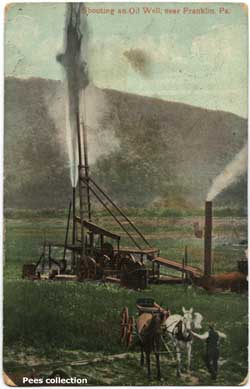 |
||||||
The Suits and The War
As soon as Roberts entered the shooting business in 1865, others who had experimented with gunpowder shots began to file for patents and claimed interferences. Their claims proved to be too late and Roberts prevailed in the courts. Those operators who wanted the services of a shooter had to deal with Roberts or a party licensed by him. This was fine with most operators because they knew they were dealing with an acclaimed professional and that they would get a big bang for their buck. The competition took Roberts to court and Roberts took them to court and much verbal gas was expended in the courtroom, but Roberts patent won out (it was issued in 1866 and reissued in 1873).
The legal exercises soon got out of hand. Everybody tried to make nitroglycerin, and shooting wells by independents under the light of the moon (moon lighters) became a questionable profession (the activity was punctuated by occasional explosions in the dead of night due to mishaps with the nitroglycerin). Writs were slapped right and left.
Roberts hired spies and paid informants to get information on who was going to shoot what well and where. According to McLaurin (1896) over two thousand prosecutions were already on the docket. Before the patent was over more than four thousand lawsuits were fought (Botsford, 1920). Oilmen were getting paranoid and afraid to even discuss their wells. Roberts was making money hand over fist, so were the lawyers and, for that matter, the well operators were getting better flows and making money as the result. There were awards (to Roberts) for damages, and jail time was meted out to some moonlighters. After a while operators felt that they were being overcharged since the competition was practically held at bay. Grumbling and soap box speeches began to take on threatening notes. Looking at it historically, the "Pipeline War" of the 1860’s was no sooner over than the so-called "Moonlight War" swung into gear. It was also called the "Great Law War". Instead of picks, clubs and pistols, the sides continued to present their cases and defense in the courts, usually in Pittsburgh, and that was a highly expensive affair. It was better to settle out of court which many did. Roberts was glad to go along with that. There was also the 1867 injunction obtained by Roberts against the Reed Torpedo Company and parties for supposed infringements against Roberts’ patent. This created a hullabaloo, but Roberts won out before the judge. Alleged infringements by others were handled in the same way. It seemed that Roberts was untouchable. Litigation continued up to the day the patent expired in 1883. Bates (1899) wrote that "….the Roberts brothers were forced to fight every inch of ground gained."
 |
A portable rig blowing out water and oil after the shot, 1908. The shooter and his buggy is in the foreground. From a postcard, Pees collection. |
![]()
| © 2004, Samuel T. Pees all rights reserved |
|